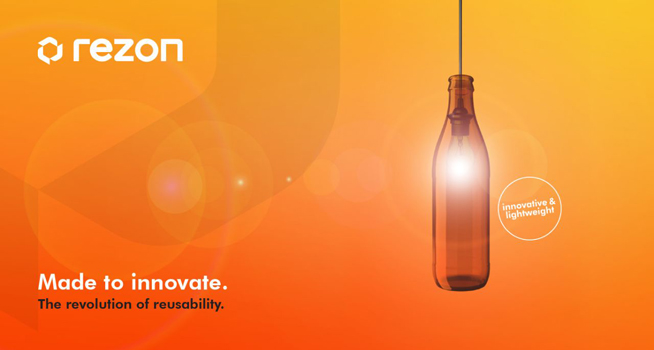Three years ago, Vetropack unveiled the world’s first thermally strengthened lightweight glass bottle, Echovai, a breakthrough in the industry.
Years of development work produced a bottle that is up to 30 percent lighter while delivering high durability and a long lifespan. Consequently, the market response was positive: in 2024, the bottle became the standard solution for the Austrian brewing industry. Brands such as Gösser and Rieder have implemented the bottles successfully. Several awards, including the WorldStar Award, the Austrian State Prize for Smart Packaging and the Swiss Packaging Award, confirm the performance of the technology.
A new brand for new possibilities
With the upcoming start of serial production in 2026, Vetropack is opening a new chapter: Echovai becomes Rezon. The new name stands for progress as well as innovative and sustainable potential. This goes not only for returnable systems but also selected single-use applications. Rezon creates new opportunities for the beverage industry, especially where light weight and a premium glass appearance are crucial.
Sustainability that pays off
The specially developed thermal strengthening process gives the bottles exceptional durability. At the end of 2024, the Versuchs- und Lehranstalt für Brauerei (VLB, Research and Teaching Institute for Brewing) tested a reusable 0.33l lightweight glass bottle that is currently on the market and a reusable lightweight glass bottle developed by Vetropack specifically for the thermal strengthening process.
The comparison showed that even after 60 use cycles, the thermally strengthened bottles exhibited far greater internal pressure and impact resistance than standard bottles. With an average burst pressure of 29.5 bar, they are almost twice as strong as the conventional version of the reusable bottles, which reach an average of 16.8 bar, a clear advantage in terms of reusability, product safety and product life span.
The reduced weight not only saves beverage manufacturers material but also lowers transport costs and CO2 emissions. Combined with the bottle’s high number of use cycles, this substantially decreases resource consumption per use. As a result, beverage producers benefit from both improved sustainability and economic efficiency, reducing the total cost of ownership (TCO) across the entire life cycle of the bottle.





